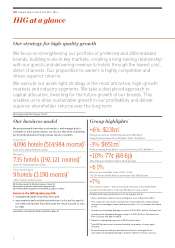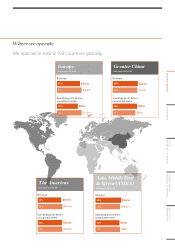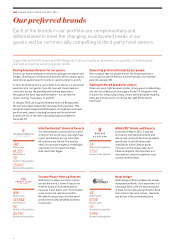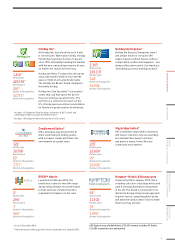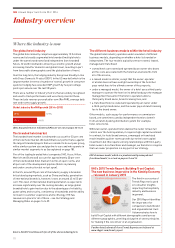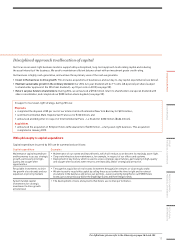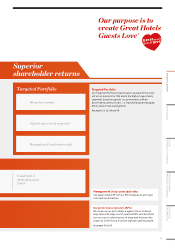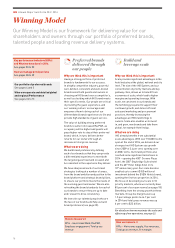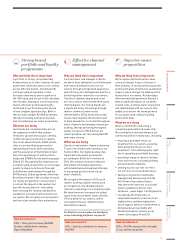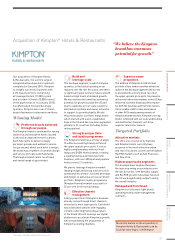Holiday Inn 2014 Annual Report Download - page 13
Download and view the complete annual report
Please find page 13 of the 2014 Holiday Inn annual report below. You can navigate through the pages in the report by either clicking on the pages listed below, or by using the keyword search tool below to find specific information within the annual report.
Where the industry is heading
Short-term drivers and global trends
Short-term industry trends are shaped by differing economic,
political or physical factors impacting local geographical markets.
Since the economic crisis of 2008/09, GDP growth has returned to
key economies, leading to an increase in disposable income and an
increase in demand for hotel rooms. Typically, the industry would
meet this demand through an increase in the supply of rooms.
Long-term drivers and global trends
In the long term, growth in the hotel industry is driven by a number
of trends:
Economic
The travel and hotel industries have benefited substantially from
long-term macroeconomic trends. Global GDP growth in the last
10 years of approximately 3.6 per cent per annum has contributed
to increasing disposable income and a greater number of
middle-class households, particularly in emerging markets
such as Greater China, with a greater propensity to travel.
Improvements in physical infrastructure, particularly in emerging
markets, have allowed hotels to meet the needs of guests more
effectively and to open up new destinations for travel.
Our growth strategy focuses on 10 priority markets comprising both
developed and emerging ones.
Demographic
Traveller demographics are continuously evolving. Many travellers
travel for a variety of reasons and no longer for a singular purpose,
such as only business or leisure. Across the globe, the types
of traveller can range from single people to multi-generation
families. The younger workforce is driving more diverse and
informal working patterns, with an expectation that hotels can
cater for flexible working arrangements. A growing ageing
population with the desire, and means, to travel is also expected
to significantly increase travel flows and lead to an overall
increase in demand for travel services.
Having a portfolio of distinct and complementary brands enables IHG
to meet a range of guests’ needs and occasions at differing price points.
Social
Other trends also provide new opportunities for increased travel.
Growing competition and capacity amongst airlines, lower air
fares and more relaxed travel restrictions in many regions have
made international travel a viable option for an increasing number
of people. Worldwide, international tourist travel is expected
to increase by 3.3 per cent a year from 2010 to 2030 reaching
1.8 billion by 2030, according to the UNWTO.
Increasingly, travellers are concerned about the sustainability
of hotels and their impact on the environment and local
communities.
We are committed to responsible business practices from
environmental sustainability to supporting our local communities.
In developed markets, recent industry revenue growth has been
driven largely by an increase in the room rate as occupancy levels
have returned to previous peak levels, but the growth in supply
of rooms has been below the long-term average. In emerging
markets, growth has been a result of both an increase in room
rate and the supply of rooms. The industry is also impacted in
the short term by local market economic or political factors.
Technology
Technology is playing an increasingly important role in
both shaping the travel industry and in guests’ appreciation
of their entire travel experience. The internet, increasingly
accessed through mobile devices, has established itself as
the preferred method to research, plan and book travel. In
emerging markets, consumers are bypassing desktop PCs and
going straight to mobile – there are twice as many smartphone
users in China than internet users in the US.
The development of social networking has changed the way in which
people think about travel, with the sharing of experiences, reviews
and recommendations influencing research and decision-making.
Travellers can make more informed decisions, and book their travel
options with greater control and immediacy, leading to an increase
in travel to a variety of destinations.
The ‘Internet of Things’ is an emerging trend that offers enormous
potential. 75 billion devices are forecast to be internet-enabled by
2020 offering the potential to transform the in-hotel guest
experience.
We focus on delivering across the entirety of the ‘Guest Journey’
and invest in developing strong technology platforms.
Competitors
These long-term drivers and global trends are changing the
competitive landscape within the travel industry. Competitors are
no longer simply branded or independent hotels, but also include
companies offering alternative lodging solutions and search
options, providing inspiration for travel ideas and aggregating a
range of travel solutions. The consumer peer-to-peer rental
market, which is largely unbranded, has also opened up a large
supply of travel accommodation. However, many of these
businesses are not subject to regulations such as fire and life
safety, food safety and local industry regulations, which apply
to traditional hotel operators.
For booking and distribution, hotel companies also compete with
the increasingly sizeable travel intermediaries.
Our channel management strategic priority considers both direct and
indirect booking and distribution channels.
What is IHG doing in light of these trends?
See Our Strategy on pages 14 to 33
11
STRATEGIC REPORT GOVERNANCE
GROUP
FINANCIAL STATEMENTS
ADDITIONAL
INFORMATION
PARENT COMPANY
FINANCIAL STATEMENTS



